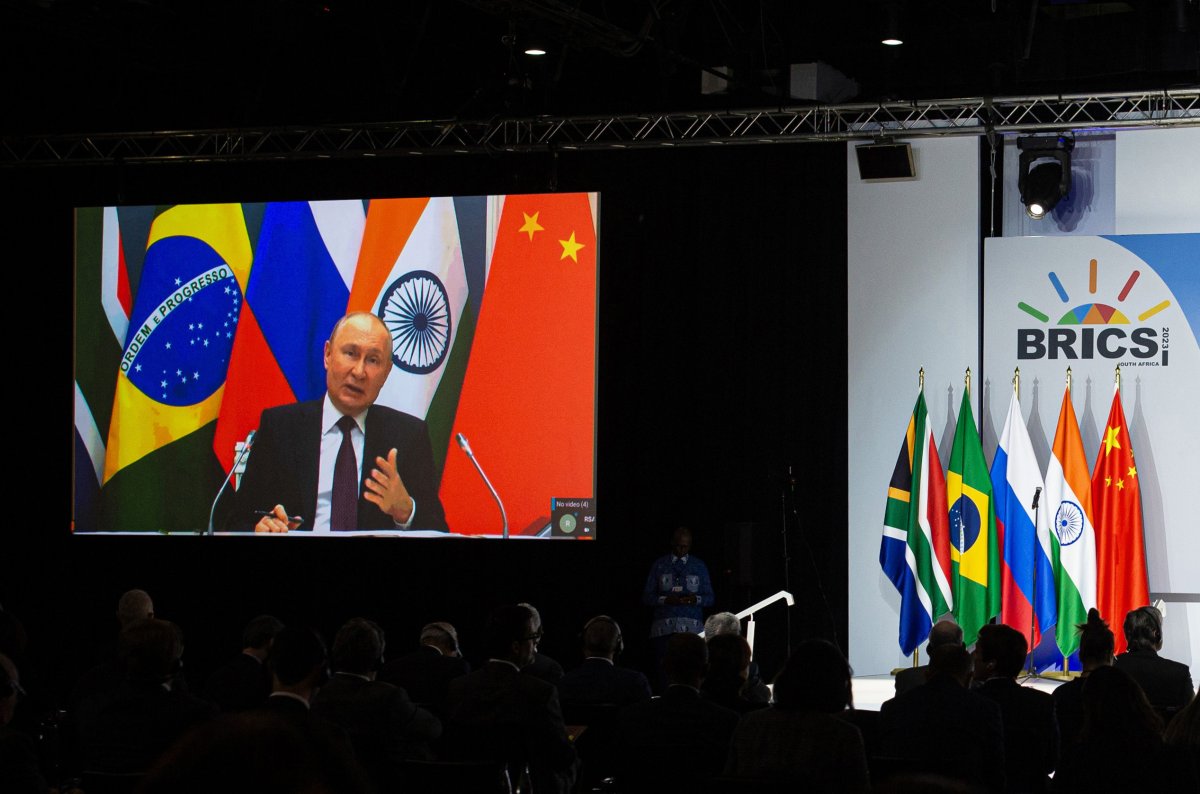Russian President Vladimir Putin insisted last August that a drop in the importance of the U.S. dollar was "irreversible"—but there appears to be no sign that the global economy is turning its back on the greenback.
Putin's video link comments to the BRICS (Brazil, Russia, India, China and South Africa) summit in Johannesburg may have been another way to lambaste the West for the sanctions it has imposed on Russia, but his wish to dethrone the dollar shows no sign of coming true for the moment.
Russia has vowed to "de-dollarize" its economy, shunning currencies from "unfriendly" countries that have condemned his aggression in Ukraine, but a graphic posted on X by financial news source Barchart on Monday showed the greenback's continuing dominance.

"The U.S. Dollar was used in 48% of international payment transactions last year, the highest level in more than a decade. But Brics...," it said next to the graph, which showed the euro making 23.2 percent of transactions and the Chinese yuan way behind at 3.47 percent.
"Many large countries like Russia and China as well as small countries like El Salvador are desperate to figure out ways to de-dollarize international trade," Jay Zagorsky, associate professor in markets, public policy and law at Boston University's Questrom School of Business, told Newsweek. "This is why Putin made his statement."
U.S. Dollar was used in 48% of international payment transactions last year, the highest level in more than a decade. But Brics... pic.twitter.com/xb5kr5thaK
— Barchart (@Barchart) April 15, 2024
Putin sees the BRICS nations as key to his vision to pivot the world economy away from the West, boasting that mutual investments and transactions between its members had increased sixfold.
The bloc's clout is increasing, growing from 18 percent of global GDP in 2010 to 26 percent in 2021, according to World Bank data from last year. With six new member states joining at the start of this year, the bloc will represent around 29 percent of the world's GDP.
"BRICS countries would like their currencies to be used in world trade, but each has a major problem preventing traders from accepting their currencies," Zagorsky said.
"China has currency controls, which limit the amount of money that can move in and out of the country. It is tough for a Chinese company to convince outsiders to accept Chinese currency if they cannot take the money out of China."
"Russia not only has currency controls, but is also under international sanctions, which limits money in rubles from flowing in and out of the country," he said.
BRICS members have begun settling trades in local currencies instead of the dollar to reduce transaction costs and limit their exposure to global volatility. For instance, India said in September 2023 its leading petroleum refiner, Indian Oil Corp., used the rupee to buy oil, traded internationally in dollars, from the Abu Dhabi National Oil Company.
India has benefited from its "friendly" country status with Russia, which has increased its sales of oil to the country, but this has hit other obstacles with Bloomberg reporting in September that Moscow cannot access rupee assets in Indian banks due to restrictions by the Reserve Bank of India.
Moscow has announced that it would work with BRICS members to develop an alternative reserve currency, and Putin said at the group's last summit such a move was "gaining momentum," but Zagorsky believes the dollar's importance is not going to wane any time soon.
"The dollar could lose its dominance if another of the world's large countries decides to eliminate all capital controls, has only peaceful intentions to other countries and keeps inflation in check," he said.
"I just do not see Russia forgoing its war in Ukraine, or China taking a more relaxed attitude to money leaving their country anytime soon. Without other countries making major changes in policy the world will continue to see the U.S. dollar maintain its dominance in world trade."
Uncommon Knowledge
Newsweek is committed to challenging conventional wisdom and finding connections in the search for common ground.
Newsweek is committed to challenging conventional wisdom and finding connections in the search for common ground.
About the writer
Brendan Cole is a Newsweek Senior News Reporter based in London, UK. His focus is Russia and Ukraine, in particular ... Read more
To read how Newsweek uses AI as a newsroom tool, Click here.








